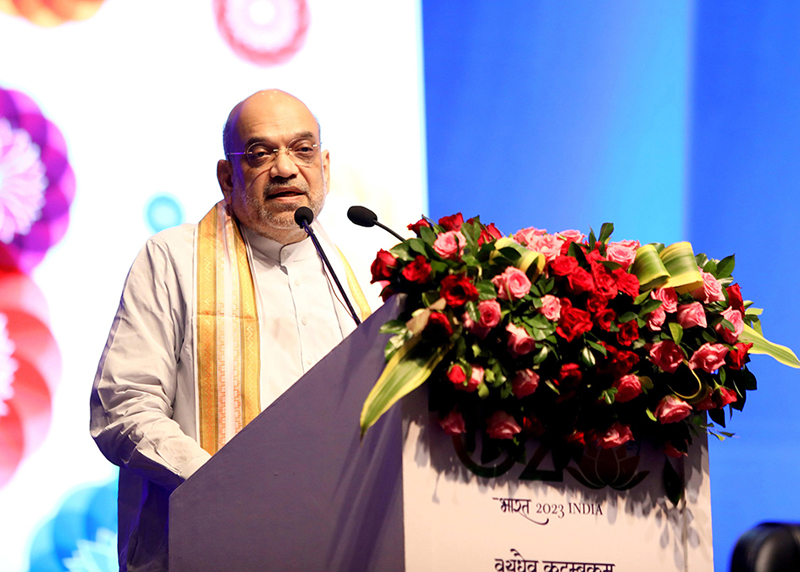
‘Act against Cyber criminals operating across borders’
GURUGRAM, July 13: Warning the global community about security challenges which have evolved from “dynamite to metaverse” and “hawala to crypto currency”, Union Home Minister Amit Shah today asked G20 member countries to rise above conventional boundaries and share information on real time to check all crimes in the cyber space.
Speaking at the ‘G20 Conference on Crime and Security in the Age of NFTs, AI & Metaverse’, he underlined the threats emanating from cyber criminals using darknet, metaverse, deepfakes, ransomware and toolkit-based misinformation campaigns and strategic targeting of critical information and financial systems.
Without taking names, Shah said some anti-social elements and global forces are using technology to cause economic and social harm to citizens and governments.
“The G20 has so far focused on digital transformation and data flow from an economic perspective, but now it is important to understand the aspects of crime and security, and find a solution,” he said.
Shah said such activities are a national concern as they directly impact national security, law and order, and the economy. If such crimes and criminals have to be stopped, we have to think and act by rising above the conventional geographic boundaries, he noted.
“Although technology is a positive development in bringing human beings, communities, and countries closer, there are also some anti-social elements and global forces that are using technology to cause economic and social harm to citizens and governments,” he added.
The Home Minister suggested a slew of measures to act against cyber criminals operating across borders like bringing uniformity in laws of all countries, developing a response mechanism under different laws of the countries, harmonising bench marks, best practices and regulations, and greater coordination among cyber agencies of all countries.
“An integrated and stable approach to cyber security policies will facilitate interoperability, increase trust in information sharing, and reduce the agency protocol and resources gaps. The need of the hour is to share ‘real-time cyber threat intelligence’ among member countries with active support from industry and academia to secure the nation’s critical infrastructure,” he said.
Cooperation in the investigation of cross-border cyber crimes through joint efforts to build a ‘peaceful, secure, deterrent and open’ information and communication technology environment is extremely necessary today, the Home Minister said.
Shah said our internet vision should neither be one of excessive freedom threatening the very existence of our nations nor one of the isolationist structures such as digital firewalls.
“Many countries have become victims of cyber attacks and this threat is hovering over all the major economies of the world. According to World Bank estimates, cyber attacks could have caused losses of around USD 5.2 trillion to the world during 2019-2023. The use of crypto currency by malicious threat actors further complicates its detection and prevention,” he said.
The Home Minister also suggested that in line with the United Nations Convention on the Criminal Use of Information and Communication Technology, speedy preservation, investigation and co-ordination of evidences is essential.
He said Computer Emergency Response Teams (CERTs) must be strengthened to deal with emerging technologies.
“There should be a 24×7 cyber securty mechanism in place for an effective ‘predictive – preventive – protective and recovery’ action. Time has come to build a ‘Transparent and Accountable Al (Artificial Intelliegence) and Emerging Technologies Governance Framework’ to ensure responsible use,” he said.
Shah said given the rise in cyber crime involving digital currency, there is a need for a “dedicated common channel” among the nations to prevent such financial irregularities.
He said third-party verification of NFT (non-fungible token used by block chains and crypto currency) platforms will increase trust and curb criminal activities.
Citing the country’s steps to counter cyber criminals, Shah said India has set up certain open-access digital infastructure models which have become examples in the world today.
“India has developed Aadhaar Model for digital identity, UPI mode for real time fast payment, Open Network for Digital Commerce (ONDC, and Open Health Service Network, among others. The world today needs a new model for digital public infrastructure to facilitate the flow of information and finance. This will facilitate the countries of the world to digitally empower their citizens,” he said.
The Home Minister said the Indian Government under Narendra Modi has worked towards outlining a uniform cyber strategy, real-time reporting of cyber-crimes, capacity building of LEAs (law enforcement agencies), designing analytical tools and setting up a national network of forensic laboratories, ensuring cyber hygiene, and spreading cyber awareness to every citizen.
“The Crime and Criminal Tracking Network and System (CCTNS) has been implemented in all police stations of the country. The Government of India has established the Indian Cyber-Crime Coordination Center (I4C) to ensure a comprehensive response against cyber crime,” he said.
Shah added that India has created world’s largest training programme in cyber security through massive open online courses platform called the ‘Cy Train’ portal.
“We aim to create a ‘Cyber Success World’ and not a ‘Cyber Failure World’. Together, we can harness the potential of these technologies while ensuring a secure and prosperous digital future for all,” he said. (PTI)

